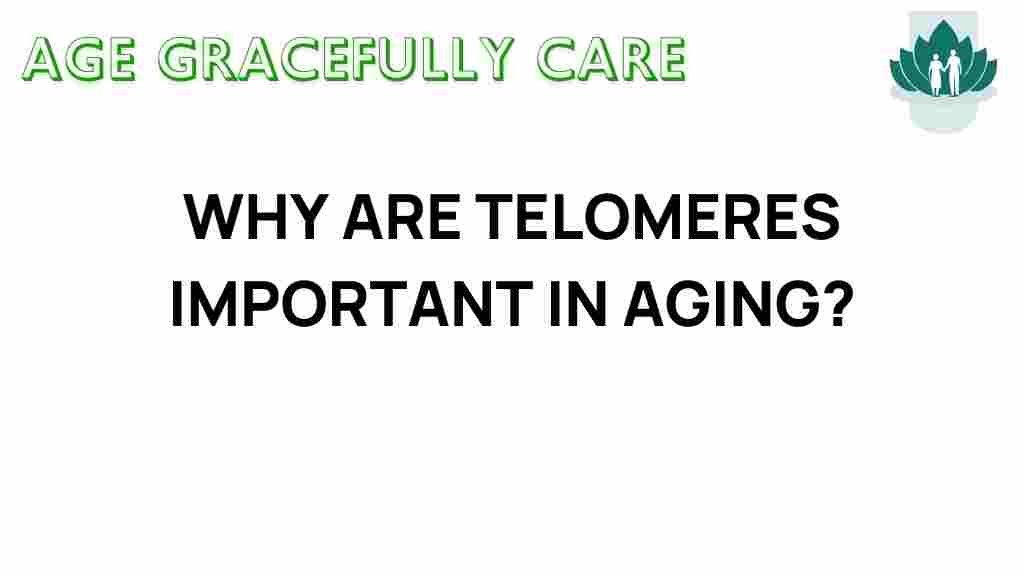Unraveling the Mystery: Why Telomeres Hold the Key to Aging
As we journey through life, the concept of aging becomes increasingly significant. Many factors contribute to how we age, but recent research has shed light on a particularly fascinating element: telomeres. These protective caps at the ends of our chromosomes play a crucial role in cellular health and longevity. Understanding telomeres can offer insights into the intricate biology of aging, lifespan, and healthspan. In this article, we will explore the relationship between telomeres, genetics, and aging, as well as the latest research findings that illuminate their importance.
What Are Telomeres?
Telomeres are repetitive nucleotide sequences located at the ends of chromosomes. Their primary function is to protect the chromosome from deterioration or fusion with neighboring chromosomes. In essence, telomeres act as a biological clock, signaling when a cell should stop dividing. As cells divide, telomeres shorten, and once they reach a critically short length, the cell can no longer divide and becomes senescent or undergoes apoptosis (programmed cell death).
The Connection Between Telomeres and Aging
The length of telomeres is directly linked to aging and cellular health. Here are some key points regarding this connection:
- Telomere Shortening: Each time a cell divides, its telomeres shorten. Over time, this shortening contributes to the aging process, as cells lose their ability to replicate.
- Cellular Senescence: When telomeres become critically short, cells enter a state of senescence, where they no longer divide. This accumulation of senescent cells is associated with aging and age-related diseases.
- Impact on Healthspan: A shorter telomere length has been correlated with reduced healthspan, which refers to the period of life spent in good health, free from serious chronic diseases.
Research on Telomeres and Longevity
Recent scientific research has focused on the role of telomeres in genetics and their implications for longevity. Here are some noteworthy findings:
- Genetic Factors: Studies have shown that genetics plays a significant role in telomere length. Certain genetic variants can influence telomerase activity, the enzyme responsible for maintaining telomere length.
- Environmental Influences: Factors such as stress, diet, and lifestyle choices can also impact telomere length. Research suggests that healthy lifestyles may slow down telomere shortening.
- Telomere Length and Lifespan: Populations with longer telomeres generally exhibit extended lifespans. For instance, centenarians often have longer telomeres compared to the average population.
Step-by-Step Process: How Telomeres Affect Cellular Health
Understanding how telomeres impact cellular health and aging can be broken down into the following steps:
1. Cell Division and Telomere Shortening
When a cell divides, it replicates its DNA. However, the mechanisms of DNA replication do not fully copy the ends of chromosomes, leading to telomere shortening with each division.
2. Telomere Critical Length
As telomeres shorten to a critical length, they trigger cellular responses that lead to senescence or apoptosis. This is a protective mechanism to prevent errors in DNA replication that could lead to cancer.
3. Accumulation of Senescent Cells
As more cells enter senescence, the body experiences a decline in cellular function. This accumulation can contribute to age-related diseases such as heart disease, diabetes, and neurodegenerative disorders.
4. Impact on Overall Health
The decline in cellular health due to telomere shortening can affect various systems in the body, ultimately influencing overall healthspan and lifespan.
Tips for Maintaining Telomere Length
While genetics play a significant role in telomere length, lifestyle choices can also make a difference. Here are some strategies to help maintain telomere length:
- Regular Exercise: Engaging in physical activity has been shown to positively influence telomere length, promoting cellular health and longevity.
- Healthy Diet: A diet rich in antioxidants, vitamins, and healthy fats can support telomere health. Foods such as berries, nuts, and leafy greens are particularly beneficial.
- Stress Management: Chronic stress has been linked to accelerated telomere shortening. Practices like meditation, yoga, and mindfulness can help manage stress levels.
- Adequate Sleep: Prioritizing sleep is essential for overall health and can have a positive impact on telomere length.
- Avoiding Toxins: Reducing exposure to environmental toxins, such as cigarette smoke and pollutants, can help protect telomeres.
Troubleshooting: Addressing Telomere-Related Issues
Despite our best efforts, some individuals may still experience issues related to telomere health. Here are some common concerns and potential remedies:
1. Rapid Aging Symptoms
If you notice signs of premature aging, such as wrinkles or fatigue, consider evaluating your lifestyle. Implementing regular exercise and a balanced diet can be beneficial.
2. Chronic Stress
For those experiencing chronic stress, incorporating relaxation techniques like mindfulness or therapy can help mitigate its effects on telomeres.
3. Genetic Predisposition
If you have a family history of age-related diseases, consult with a healthcare professional. Genetic testing may provide insights into your risk and potential preventative measures.
Conclusion
Telomeres are a key component in the complex puzzle of aging, cellular health, and longevity. The research surrounding telomeres has opened new avenues for understanding how we can potentially extend both lifespan and healthspan. By focusing on maintaining telomere length through lifestyle choices, we may not only improve our health but also enhance our quality of life as we age. The journey into the world of telomeres is still unfolding, and ongoing research promises to reveal even more about their critical role in aging and genetics.
For more information on the latest research regarding telomeres and aging, visit this resource. To dive deeper into the science of cellular health, check out this article.
This article is in the category Health and created by AgeGracefullyCare Team
